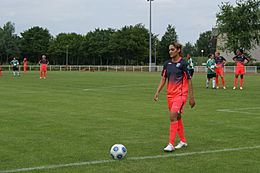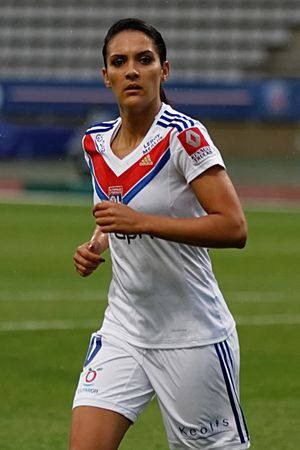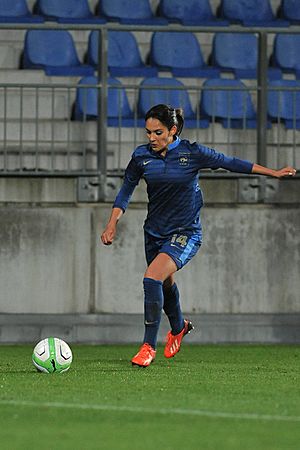Louisa Cadamuro facts for kids
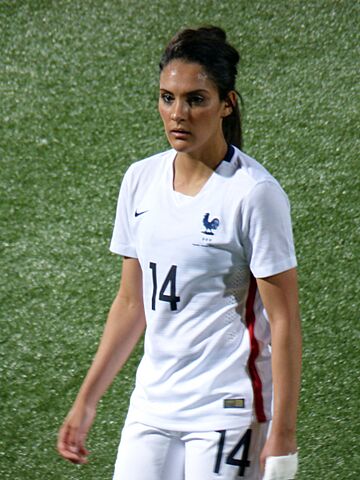
Nécib with France in 2015
|
|||
| Personal information | |||
|---|---|---|---|
| Full name | Louisa Nécib Cadamuro | ||
| Date of birth | 23 January 1987 | ||
| Place of birth | Marseille, France | ||
| Height | 1.68 m (5 ft 6 in) | ||
| Position(s) | Midfielder | ||
| Youth career | |||
| 2000–2002 | US Marseille | ||
| 2002–2004 | Celtic de Marseille | ||
| Senior career* | |||
| Years | Team | Apps | (Gls) |
| 2004–2006 | CNFE Clairefontaine | 38 | (9) |
| 2006–2007 | Montpellier | 20 | (11) |
| 2007–2016 | Lyon | 173 | (64) |
| Total | 231 | (84) | |
| International career | |||
| 2003 | France U17 | ||
| 2004–2005 | France U19 | ||
| 2006 | France U20 | 6 | (2) |
| 2005–2016 | France | 145 | (36) |
| *Club domestic league appearances and goals | |||
Louisa Nécib Cadamuro (born on January 23, 1987) is a French former professional footballer. She played for the French national team. Louisa spent most of her career at Lyon. There, she won many titles over nine years. She was an attacking midfielder, known for her amazing skills. People often called her a "gifted playmaker" with "superb technique".
Louisa Nécib was also known for her "elegant possession" of the ball. She had "sublime passing skills" and a "cultured touch". The French media even called her "the female Zidane". This was because she, like Zidane, had Algerian family roots. She also grew up in Marseille and had incredible football skills. She was especially good as a playmaker who could score goals. Because of this, her nickname was "Ziza", similar to Zidane's "Zizou".
In an interview, Louisa said Zidane was a role model for her. She loved watching him play. She mentioned that the comparison happened a lot when she started playing. She felt proud of it but believed no one could truly be compared to Zidane. He was unique. In 2004, she even met Zidane at the Clairefontaine academy. They swapped shirts, and her father still has Zidane's shirt.
Louisa started her football journey with youth clubs in her hometown of Marseille. These included Union Sportive Marseille and Celtic de Marseille. With Celtic, she played her first senior game in 2003. The next season, she helped them win the Division 3 Féminine. In 2004, Louisa was chosen to train at CNFE Clairefontaine. This was a special academy for women footballers. After two years there, she joined Montpellier in 2006. In her only season with Montpellier, she helped them win the 2006–07 Challenge de France.
After Montpellier, she moved to Lyon. At Lyon, Louisa won many trophies. These included four league titles, another Challenge de France, and a UEFA Women's Champions League title. For her great play in the 2008–09 season, she was named the National Union of Professional Footballers (UNFP) Female Player of the Year.
Louisa also played for France's youth teams. She played at all levels she was old enough for. At the under-19 level, she played in the 2004 and 2005 UEFA Women's Under-19 Championships. With the under-20 team, she played in the 2006 FIFA U-20 Women's World Championship. She scored a goal against Argentina as France reached the quarter-finals.
Louisa made her first senior international appearance in February 2005. This was in a friendly match against Norway. In March 2007, she scored her first senior international goal. This happened in a UEFA Women's Euro 2009 qualifying win against Greece. She played in five big international tournaments for France. These included the 2005 and 2009 UEFA Women's Euros. She also played in the 2011 and 2015 FIFA Women's World Cup. Her last major tournament was the 2012 Summer Olympics. At the Olympics, she was a key playmaker. She helped the team finish in fourth place.
Contents
Her Club Journey
Starting Out
Louisa began her football journey playing for youth clubs. She started with Union Sportive de Marseille. After two years, she joined Celtic de Marseille. She trained there for six months. In April 2002, she was chosen for a special under-16 National Cup. This competition was a training camp for the CNFE. This is the women's section of the famous Clairefontaine academy.
Clairefontaine became a top training place for male players. In the 1990s, women were also allowed to train there. This meant young women could use the same great facilities. At the National Cup, Louisa played very well. Coaches even gave her an award for having the best shot. After the competition, she went back to Celtic.
At 16, Louisa joined Celtic's senior team in 2002–03. She played with future national teammate Caroline Pizzala. In the 2003–04 season, Louisa really shined. She helped Celtic reach the Division 3 Féminine league final. They played against Le Mans' women's team. Louisa played the whole game as Celtic won 4–1. This win promoted the club to Division 2 Féminine. Her great play that season earned her the nickname Titou. This was a tribute to Zinedine Zidane, who was called Zizou.
Clairefontaine Academy
In July 2004, Louisa was chosen to attend the CNFE academy at Clairefontaine. At first, she found it hard. She said, "the first year was really hard because I was so far from my family. I almost gave up". But she soon became friends with future teammates. These included Sarah Bouhaddi, Élodie Thomis, and Laure Boulleau. She quickly got back to her best form.
The CNFE academy team played in the Division 1 Féminine. Louisa spent two seasons with this team. She played her first league game on August 29, 2004, against Lyon. In that match, she scored the only goal in the 90th minute, winning 1–0. Louisa played 20 league games that season and scored six goals. Four of her goals came in the last four weeks. She scored two goals against Juvisy on March 26, 2005. A week later, she scored the winning goal against Olympique Saint-Memmie. On the last day, she scored in a 5–1 win over Lyon. CNFE finished 5th that season. The next season, Louisa played 18 matches and scored three goals, all in wins.
Time at Montpellier
After finishing her training at Clairefontaine, Louisa went back to the south of France. She signed with Montpellier, a Division 1 Féminine club. Her former Clairefontaine teammate Thomis also joined. Louisa played her first game on September 3, 2006. It was a 0–0 league draw with Toulouse. Two weeks later, on September 17, she scored her first two goals for the club. This was in a 5–0 away win over USCO Compiègne.
On October 8, Louisa scored in a 2–0 win against Soyaux. In November, she scored two goals in wins against FCF Condé-sur-Noireau and Hénin-Beaumont. She ended the season with 11 league goals. This was the third-highest on the team. In the Challenge de France, France's domestic cup, Louisa helped Montpellier reach the final. They played against Lyon. She played the whole match as Montpellier won 3–0 on penalties. This cup title was Louisa's first big win in her career.
Success with Lyon
After that season, on June 22, 2007, Lyon announced they had signed Louisa and Thomis. Louisa wore the number 14 shirt. She played her first game for Lyon on September 2, 2007. It was a 4–0 win over La Roche-sur-Yon. A week later, she scored her first goal for Lyon. It was a penalty kick in a 2–0 win against Paris Saint-Germain.
Louisa also played in European competitions for the first time. She played in the 2007–08 UEFA Women's Cup. In her first game, she scored three goals in a 12–0 win. She played ten European matches and scored six goals. Lyon reached the semi-finals but lost to Umeå from Sweden. Louisa also kept scoring in the league. Lyon won its second league title in a row, and Louisa's first. She then helped Lyon win its third Challenge de France. This meant Lyon won both the league and cup that season. She scored in the 3–0 final win over Paris Saint-Germain.
At the start of the 2008–09 season, Louisa was chosen for a new US league. Her playing rights were given to the Washington Freedom. Her Lyon teammate Sonia Bompastor also went there. But Lyon's chairman, Jean-Michel Aulas, convinced Louisa to stay in France. Louisa scored her first league goal of the season on September 14, 2008. It was in a 12–0 home win. A month later, she scored two goals in an 8–1 win. She scored two more goals on February 1, 2009, in a 5–0 away win.
In the UEFA Women's Cup, Louisa scored two goals in an 8–0 win. Lyon reached the semi-finals again. But they were knocked out by German team FCR 2001 Duisburg. In the league, Lyon won its third straight title. However, they lost in the Challenge de France semi-finals. For her great play, Louisa was named the UNFP Female Player of the Year.
In the 2009–10 season, Louisa changed to the number 10 shirt. She missed some early games due to playing in UEFA Women's Euro 2009. In her first start, she scored two goals in a 5–0 win. In November, she got injured while playing for France. She missed five weeks. She returned in the new year and scored in a 4–0 win. Louisa scored two more goals in the last four league games. Lyon won its fourth league title in a row. They also reached the Challenge de France semi-finals.
In the new UEFA Women's Champions League, Louisa played eight games and scored four goals. Lyon reached the final. In the semi-finals, she scored two goals in a 3–2 win. Lyon then played German club Turbine Potsdam in the final. Louisa played the whole game. Lyon lost on penalties.
In the 2010–11 season, Louisa scored 14 goals. This was her second time scoring double-digit goals for Lyon. She started the season by scoring in a 6–0 win. Two weeks later, she scored in a 3–0 win. On January 9, 2011, she scored two goals in a 7–0 home win. Two weeks later, she scored two more goals in a 7–1 win. In the Challenge de France, she scored in two rounds. On the last day of the season, Louisa scored her first league hat trick. This was in an 8–0 victory. Lyon had already won its fifth league title.
In the 2010–11 Women's Champions League, she scored her only goal on November 4, 2010. This was in a 6–1 away win. Lyon reached the final again. They played Turbine Potsdam. Louisa started the match. Lyon won 2–0 to claim its first European title.
After the 2011–12 season, Louisa's contract with Lyon ended. Some thought she might join Paris Saint-Germain. But on July 16, 2012, Louisa signed a new four-year contract with Lyon. On May 21, 2016, Lyon confirmed that Louisa and her friend Lotta Schelin were leaving the club. In July 2016, she said she would stop playing football after the 2016 Summer Olympics.
Playing for France
Youth Teams
Louisa played for France's youth national teams. She played at every level she could. On September 11, 2003, she was called up to the under-17 team. She played in the Nordic Cup, a top youth tournament. Then, she joined the under-19 team.
At the under-19 level, Louisa played a lot. She played in the La Manga Cup. She also represented France in the 2004 and 2005 UEFA Women's Under-19 Championships. In 2004, France was knocked out in the group stage. In 2005, Louisa started all five matches. France reached the final. She scored her only goal in a 4–0 win against Russia. In the final, France lost to Russia on penalties after a 2–2 draw.
Because France finished second in 2005, they qualified for the 2006 FIFA U-20 Women's World Championship. Louisa played for the under-20 team. She made her under-20 debut on August 12, 2006. This was in a friendly against Mexico. She scored France's second goal in a 4–2 win. At the World Cup, Louisa played in all four of France's matches. In the first game against Argentina, she scored France's third goal in a 5–0 win. France lost 2–1 to North Korea in the quarter-finals.
Senior Team
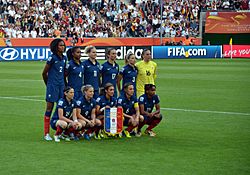
Before playing in the 2005 UEFA Women's Under-19 Championship, Louisa made her senior international debut. This was on February 19, 2005, in a friendly against Norway. She started the match, and France won 2–0. This was France's first win against Norway. Even though she had only played two senior games, Louisa, at 18, was chosen for UEFA Women's Euro 2005. She played in one match, against Germany. Germany won 3–0. In 2010, Louisa said she still regretted that loss. France had played well but let in three goals in the last 20 minutes.
After the 2006 U-20 World Cup, Louisa started playing full-time for the senior team. She played in qualification matches for the 2007 FIFA Women's World Cup. She also played in the 2006 Algarve Cup. On April 22, 2006, she played in a 5–0 World Cup qualification win. France missed the World Cup after drawing 1–1 with England. France needed a win to qualify.
After a new coach, Bruno Bini, took over in 2007, Louisa became a regular starter. On April 11, 2007, she scored her first international goal. This was in a 6–0 win over Greece in Euro 2009 qualification. She started in all seven qualification matches she played. She scored another goal in an 8–0 win over Serbia. France qualified for the competition early.
Before UEFA Women's Euro 2009, France played in the 2009 Cyprus Cup. Louisa played in three matches. She scored France's second goal in a 3–2 win over South Africa. France finished third in the competition. Louisa scored her fourth international goal in a friendly against Scotland. In her second major tournament for France, Louisa started all four matches. She scored her first big international goal in the opening game against Iceland. France won 3–1. France reached the quarter-finals but lost to the Netherlands on penalties.
After Women's Euro 2009, Louisa played in qualification for the 2011 FIFA Women's World Cup. She played in nine of the ten group stage matches. France won all its matches and did not let in any goals. Louisa scored two goals during this round. One was against Estonia in a 12–0 win. The other was against Northern Ireland in a 6–0 win. In September 2010, she played in both games of France's World Cup playoff against Italy. France won 3–2 overall and qualified for its second World Cup. On November 19, 2010, Louisa scored her first two international goals in one game. This was in a 5–0 friendly win over Poland.
After playing in the 2011 Cyprus Cup and other friendly matches, Louisa was named to the World Cup squad on June 6, 2011. On June 18, in a friendly against Belgium, she scored her tenth international goal. This was in a 7–0 home win.
On June 26, 2011, in France's first World Cup game against Nigeria, Louisa was named the Player of the Match. This was for her performance in the 1–0 win. In the second game against Canada, she helped set up the last goal in a 4–0 win. Louisa started France's last four matches in the competition. This included a 4–2 loss to Germany and a penalty shootout win over England. France was knocked out in the semi-finals, losing 3–1 to the United States. On July 16, in the third-place match against Sweden, Louisa had to leave after 30 minutes due to a knee injury. France lost 2–1. During and after the World Cup, Louisa was praised for her play. Many said she was a big reason France reached the semi-finals.
How She Played
Louisa mostly played as an attacking midfielder. But she could also play in central midfield as a deep-lying midfielder. Sometimes, she played as a winger. For her club, she usually played as a playmaker in the number 10 role. For the national team, she played as a winger.
Two of Louisa's best skills were her vision and passing. People called them "one-of-a-kind" and "sublime". She also understood the game very well. This gave her a "great football IQ". Besides being creative and good at scoring, she was known for her excellent control and dribbling. She was also very elegant with the ball. Her technical skills helped her know when to dribble past a defender. She knew how to pass to a teammate and create chances for herself and others. Because of these skills, her playing style was often compared to Zinedine Zidane.
Her Life Off the Field
Louisa Nécib was born on January 23, 1987, in Marseille. Her parents were from Algeria. Her father came from Biskra, and her mother from Oran. Louisa grew up in Busserine, a neighborhood in Marseille. She has a brother and a sister. After joining Lyon, Louisa studied at the Université Lyon 1. She wanted to study sports science.
She became interested in football when she was young. Before that, she trained in gymnastics. At first, she didn't think about women's football. She mostly played with boys for fun. She said, "I didn't plan to join a club because, to be honest, I didn't know girls' teams existed. Then, one day I found out there was a club... and I signed up".
In June 2016, she married footballer Liassine Cadamuro-Bentaïba.
Career Numbers
Club Appearances and Goals
| Club | Season | League | Cup | Continental | Total | ||||
|---|---|---|---|---|---|---|---|---|---|
| Apps | Goals | Apps | Goals | Apps | Goals | Apps | Goals | ||
| CNFE Clairefontaine | 2004–05 | 20 | 6 | 0 | 0 | – | 20 | 6 | |
| 2005–06 | 18 | 3 | 0 | 0 | – | 18 | 3 | ||
| Total | 38 | 9 | 0 | 0 | 0 | 0 | 38 | 9 | |
| Montpellier | 2006–07 | 20 | 11 | 1 | 0 | – | 21 | 11 | |
| Lyon | 2007–08 | 21 | 8 | 5 | 3 | 10 | 6 | 36 | 17 |
| 2008–09 | 19 | 10 | 2 | 1 | 7 | 3 | 28 | 14 | |
| 2009–10 | 15 | 7 | 3 | 0 | 8 | 4 | 26 | 11 | |
| 2010–11 | 21 | 14 | 3 | 2 | 9 | 1 | 33 | 17 | |
| 2011–12 | 21 | 9 | 6 | 1 | 8 | 2 | 35 | 12 | |
| 2012–13 | 20 | 3 | 7 | 1 | 10 | 6 | 37 | 10 | |
| 2013–14 | 21 | 4 | 3 | 1 | 4 | 3 | 28 | 8 | |
| 2014–15 | 16 | 2 | 3 | 0 | 4 | 2 | 23 | 4 | |
| 2015–16 | 19 | 7 | 4 | 2 | 8 | 3 | 31 | 12 | |
| Total | 173 | 64 | 36 | 11 | 68 | 30 | 277 | 105 | |
| Career total | 231 | 84 | 37 | 11 | 68 | 30 | 336 | 125 | |
International Appearances and Goals
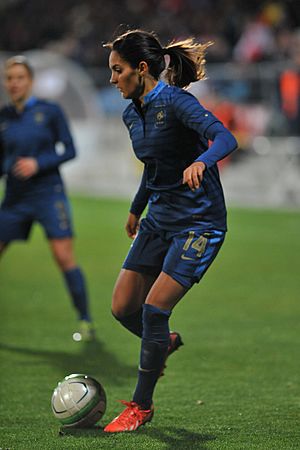
| National team | Year | Apps | Goals |
|---|---|---|---|
| France | 2004–05 | 3 | 0 |
| 2005–06 | 8 | 0 | |
| 2006–07 | 7 | 1 | |
| 2007–08 | 6 | 1 | |
| 2008–09 | 7 | 1 | |
| 2009–10 | 15 | 4 | |
| 2010–11 | 14 | 3 | |
| 2011–12 | 17 | 5 | |
| 2012–13 | 20 | 5 | |
| 2013–14 | 21 | 10 | |
| 2014–15 | 12 | 3 | |
| 2015–16 | 9 | 1 | |
| 2015–16 | 6 | 2 | |
| Total | 145 | 36 | |
- Scores and results list France's goal tally first, score column indicates score after each Cadamuro goal.
| No. | Date | Venue | Opponent | Score | Result | Competition |
|---|---|---|---|---|---|---|
| 1 | 11 April 2007 | Stade Georges Pompidou, Valence, France | 4–0 | 6–0 | UEFA Women's Euro 2009 qualifying | |
| 2 | 27 October 2007 | Stadion Kralj Petar I, Belgrade, Serbia | 3–0 | 8–0 | UEFA Women's Euro 2009 qualifying | |
| 3 | 10 March 2009 | Makario Stadium, Nicosia, Cyprus | 2–0 | 3–2 | 2009 Cyprus Cup | |
| 4 | 12 August 2009 | Stade des Grands Prés, Chartres, France | 3–0 | 4–0 | Friendly | |
| 5 | 24 August 2009 | Ratina Stadion, Tampere, Finland | 3–1 | 3–1 | UEFA Women's Euro 2009 | |
| 6 | 28 October 2009 | Stade Jules Deschaseaux, Le Havre, France | 2–0 | 12–0 | 2011 FIFA Women's World Cup qualification | |
| 7 | 27 March 2010 | Stade de la Libération, Boulogne-sur-Mer, France | 5–0 | 6–0 | 2011 FIFA Women's World Cup qualification | |
| 8 | 19 November 2010 | Stade Jean Bouin, Angers, France | 2–0 | 5–0 | Friendly | |
| 9 | 3–0 | |||||
| 10 | 18 June 2011 | Stade de l'Épopée, Calais, France | 6–0 | 7–0 | Friendly | |
| 11 | 22 September 2011 | Turners Cross, Cork, Ireland | 1–0 | 3–1 | UEFA Women's Euro 2013 qualifying | |
| 12 | 16 November 2011 | Stade René Serge Nabajoth, Pointe-à-Pitre, Guadeloupe | 3–0 | 8–0 | Friendly | |
| 13 | 20 November 2011 | Stade Pierre-Aliker, Fort-de-France, Martinique | 1–0 | 5–0 | Friendly | |
| 14 | 4 March 2012 | Paralimni Stadium, Paralimni, Cyprus | 1–0 | 3–0 | 2012 Cyprus Cup | |
| 15 | 6 March 2012 | GSZ Stadium, Larnaca, Cyprus | 2–0 | 2–0 | 2012 Cyprus Cup | |
| 16 | 4 July 2012 | Stade de la Source, Orléans, France | 3–0 | 6–0 | Friendly | |
| 17 | 19 September 2012 | Tynecastle Stadium, Edinburgh, Scotland | 4–0 | 5–0 | UEFA Women's Euro 2013 qualifying | |
| 18 | 13 February 2013 | Stade de la Meinau, Strasbourg, France | 1–1 | 3–3 | Friendly | |
| 19 | 2–1 | |||||
| 20 | 9 March 2013 | Stade Robert Diochon, Rouen, France | 1–1 | 1–1 | Friendly | |
| 21 | 18 July 2013 | Arena Linköping, Linköping, Sweden | 2–0 | 3–0 | UEFA Women's Euro 2013 | |
| 22 | 22 July 2013 | Arena Linköping, Linköping, Sweden | 1–1 | 1–1 | UEFA Women's Euro 2013 | |
| 23 | 20 September 2013 | Stade Robert Bobin, Bondoufle, France | 2–0 | 2–0 | Friendly | |
| 24 | 25 October 2013 | Stade Pierre Brisson, Beauvais, France | 4–0 | 6–0 | Friendly | |
| 25 | 31 October 2013 | Sonnensee Stadion, Ritzing, Austria | 1–0 | 3–1 | 2015 FIFA Women's World Cup qualification | |
| 26 | 28 November 2013 | MMArena, Le Mans, France | 4–0 | 14–0 | 2015 FIFA Women's World Cup qualification | |
| 27 | 8 February 2014 | Stade de la Licorne, Amiens, France | 2–0 | 3–0 | Friendly | |
| 28 | 3–0 | |||||
| 29 | 7 March 2014 | GSP Stadium, Nicosia, Cyprus | 3–0 | 3–2 | 2014 Cyprus Cup | |
| 30 | 20 June 2014 | Rentschler Field, Hartford, USA | 1–0 | 2–2 | Friendly | |
| 31 | 13 September 2014 | ISS Stadion, Vantaa, Finland | 1–0 | 2–0 | 2015 FIFA Women's World Cup qualification | |
| 32 | 17 September 2014 | Stade de l'Épopée, Calais, France | 2–1 | 3–1 | 2015 FIFA Women's World Cup qualification | |
| 33 | 26 June 2015 | Olympic Stadium, Montreal, Canada | 1–0 | 1–1 | 2015 FIFA Women's World Cup | |
| 34 | 26 January 2016 | La Manga Stadium, La Manga, Spain | 1–0 | 1–0 | Friendly | |
| 35 | 9 August 2016 | Arena Fonte Nova, Salvador, Brazil | 2–0 | 3–0 | 2016 Olympic Games | |
| 36 | 3–0 |
What She Won
Celtic Marseille
- Division 3 Féminine: 2003–04
Montpellier
- Challenge de France: 2006–07
Lyon
- Division 1 Féminine (9): 2007–08, 2008–09, 2009–10, 2010–11, 2011–12, 2012–13, 2013–14, 2014–15, 2015–16
- Coupe de France Féminine (6): 2007–08, 2011–12, 2012–13, 2013–14, 2014–15, 2015–16
- UEFA Women's Champions League: 2010–11, 2011–12, 2015–16
- International Women's Club Championship: 2012
- Valais Cup: 2014
France
- Cyprus Cup: 2012, 2014
Individual Awards
- UNFP Female Player of the Year: 2008–09
- FIFA Women's World Cup All-Star Team: 2011
- FIFA Puskás Award nominee 2013
See also
 In Spanish: Louisa Nécib para niños
In Spanish: Louisa Nécib para niños
 | Janet Taylor Pickett |
 | Synthia Saint James |
 | Howardena Pindell |
 | Faith Ringgold |


